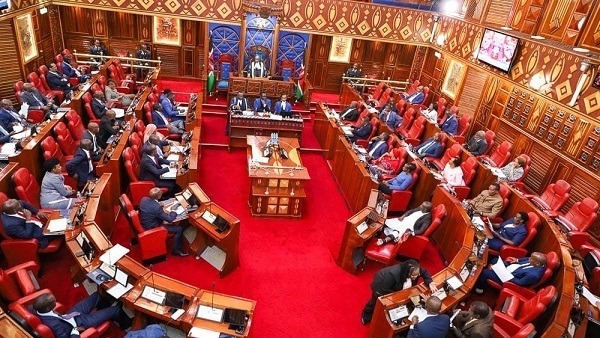
 Senate/FILE
Senate/FILE
The Senate has invited members of the public to submit their views on the Seeds and Plant Varieties (Amendment) Bill, 2025.
The Bill was read for the first time on July 9 and has now been referred to the Senate Committee on Agriculture, Livestock and Fisheries for further consideration.
“The committee is required under Standing Order 145(5) to facilitate public participation and consider views and recommendations from the public when preparing its report to the Senate,” said Senate clerk Jeremiah Nyegenye in a notice issued on Wednesday.
The proposed law seeks to amend the Seeds and Plant Varieties Act (Cap 326) by introducing a standards-based seed registration system. This system, to be managed by the Kenya Bureau of Standards, is intended to offer an alternative to the current seed certification process.
The goal is to fast-track approval of new seed varieties, reduce registration delays and improve farmers’ access to high-quality, climate-resilient seeds.
The Bill proposes adding new sections, 10A, 10B and 10C into the Act to create this system. Anyone seeking to register a seed variety under the new model will be required to submit an application to KEBS in a prescribed format.
According to the notice, written submissions from the public should be sent to the Clerk of the Senate by July 29.
Joyce Karanja, CEO of the Seed Trade Association of Kenya, said they have already engaged their members to review the proposed changes and share feedback.
“We will consolidate our members’ views and request a meeting with the Senate to present a unified position,” she said.
Stak represents seed companies registered by the Kenya Plant Health Inspectorate Service to produce, market and distribute seeds. The association controls 90 per cent of Kenya’s formal seed market.
Instant analysis
The Bill proposes that under the new system, a seed variety application must include technical data showing it meets minimum germination and purity standards, and proof that it is free of noxious weeds and seed-borne diseases.
In addition, the application must show evidence that the applicant is a registered seed merchant, and there must be a physical sample of the variety, which will serve as the genetic reference
The Bill further proposes that KEBS will have 60 days to review each application and either approve or reject it in writing. If approved, the applicant will receive a certificate of registration, valid for five years and renewable upon request.
The Bureau will also have the power to revoke the certificate if the variety fails to meet quality standards in post-market monitoring, the certificate was obtained through fraud or misrepresentation, or if the variety is found to be counterfeit and does not match the original sample.












